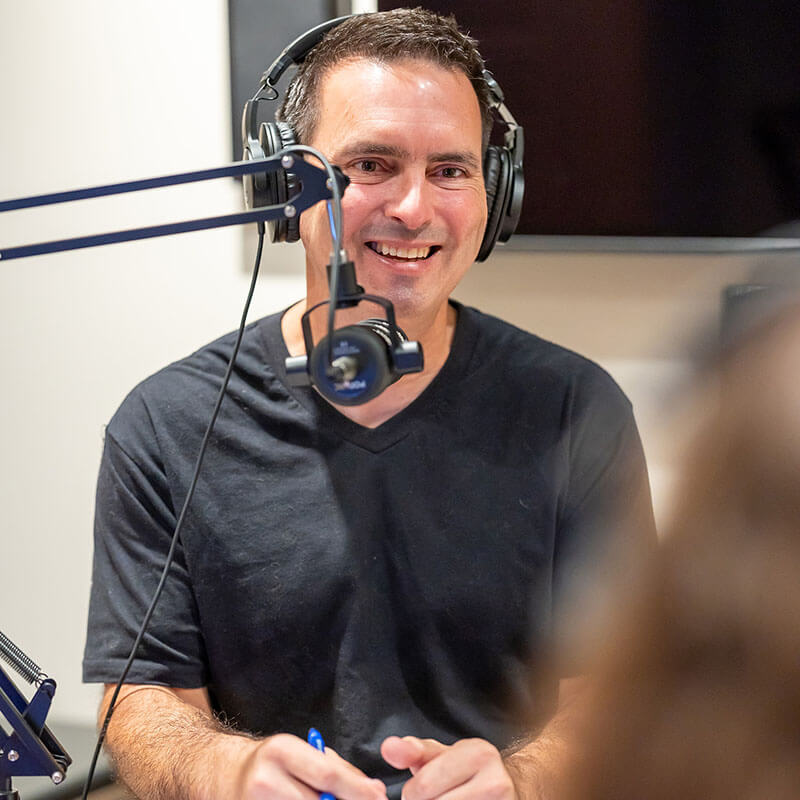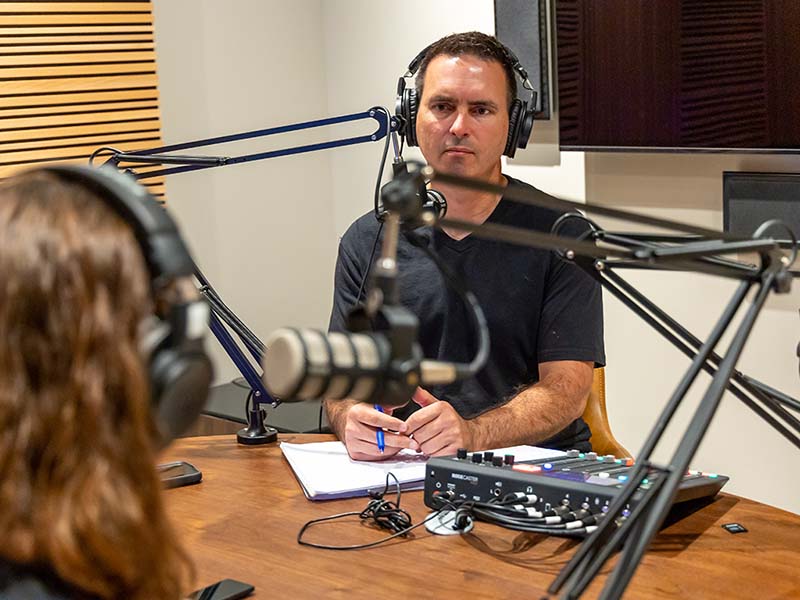If you’ve thought about joining a podcast to spread your message and demonstrate your expertise, but are not sure how a podcast interview can help you grow your small business, I have some tips for you.
If you’re self-employed or own a small business, chances are you’ll want to be featured on a podcast at some point. If you’re already a reasonably successful small business owner, you’ll probably be invited to join a podcast for an interview if you haven’t already.
Being featured on a respected podcast can be a great opportunity to generate some leads for your small business if you play your cards right.
I’ve hosted over 250 podcast interviews since 2020 and interviewed guests from a wide range of industries and backgrounds.
In this article, I’m going to share 7 ways the best small business owners maximize their podcast interviews!
Podcast Interview Tips for Small Business Owners
1. Prepare for the Podcast Interview
Nothing makes a podcast producer happier than knowing you listen to their podcast. You should listen to a few episodes before ever reaching out to the producer or booking an interview.
Listen to a few episodes… Your PR agent may have booked the interview for you or maybe you’re joining based solely on the podcast’s reputation. Either way, make sure you listen to a few episodes before sitting down to record.
Knowing how the interviews flow and getting familiar with the host’s personality will greatly increase the quality of your recording.
Learn more… While you’re at it, have a look at their website and social media. This will give you insights into their business and come in handy when it comes to establishing rapport.
Establishing some common ground with the host will help your interview stand out among the rest of the interviewees.
Bonus: If they have an email newsletter, subscribe! If you do any sort of email marketing, you understand how important this is to the host.
2. Have the Right Gear
If you’re recording your podcast interview remotely, make sure you have the proper gear to produce the highest quality audio. I guarantee the host will be using an external microphone and headset earphones, and you should, too.
Why? Because the built-in mic in your laptop computer will pick up ambient sounds in the room, and it will sound like you’re talking on a phone (at best.) Using headset earphones, or at least earbuds, will ensure the host’s audio doesn’t echo in the recording.
Invest in your brand… If you’re planning on booking guest spots on more podcasts in the future (and you should) then go ahead and invest in a proper mic with a desk-mounted boom arm, and a good set of headphones.
After all, if your audio sounds distorted then listeners will simply move on to another podcast and won’t stick around to hear your great story or important message.
Here are my top picks for podcast mics and headphones that won’t break the bank:
- Rode PodMic – $99 on Amazon
- Audio-Technica ATH-M30x Studio Monitor Headphones – $69 on Amazon
- Rode PSA1 Microphone Boom Arm – $99 on Amazon
3. Script your story
If you’re self-employed or own a business, you’ve probably scripted an “elevator pitch” at some point. In other words, a 30-second commercial that quickly and clearly articulates your value proposition.
If you’ve determined after listening to the host’s other episodes that you’re likely to be asked to share your background, you’ll want to know exactly what to say.
Rehearse… Trying to “wing it” and share your background story by making it up in the moment is a very frustrating experience. Often, we leave things out that we later regret not sharing, or vice versa – we share something we shouldn’t have.
Get it on paper… Start a text document and begin writing your background story. Decide how long you need it to be. Most people speak comfortably at 110-150 words per minute, so for 3 minutes, keep your life story to around 400 words.
Revise and refine… Once you have the first draft finished, put it down and walk away. Come back to it in a day or two and read it again. Revision ideas will likely pop off the page for you. Make those revisions and read it aloud.
Keep it relevant… Focus on sharing life experiences that formed the basis for your current business or expertise. You can skip the story about your under-12 soccer championship in 1985. (this happened)
Move on… Don’t dwell on this. Chances are it’s not your personal life story that interests the host and her audience. Give them the quick and easy version and allow the host to move on to the reason they invited you onto the podcast in the first place.
4. Help the host help you
Very few podcast hosts are professional broadcast journalists. Chances are that they’re just as nervous (or more so) as you are about making a great recording.
Plan ahead… If the host sends you an outline of topics ahead of time, be sure to add at least one additional topic that you’d like to talk about. Chances are that the outline she sends you is the same one that she sends to all guests, so make their job of producing an interesting podcast easier by adding something original to the conversation.
Throw a softball… The host is human, too. She’s not always in top form, and this might be one of those days. If the host has a brain fog moment, help her out by interjecting a funny comment or expanding on a previous topic. Be ready!
Pro tip: Nothing beats laughter. Tell a joke or share a funny (but relevant) story to break up an otherwise monotonous conversation. Lighten the mood – everyone will appreciate it.
5. Be likable
Audiences can tell if you’re having fun. Listeners can “hear” a smile. The sooner you can establish some common ground and build rapport, the more fun this is going to be for you, the host, and his audience.
Banter… Engage the host in a natural conversation, smile a lot, and be genuinely appreciative of the opportunity to share your story on their platform. Did you find some common ground when researching the podcast? Bring it up!
You’re on the clock… Answer questions completely, but be mindful of the time. If episodes for the podcast run 30 minutes and you have 5 topics to cover, then don’t digress. Keep your answers and commentary on-topic and allow the host to keep the conversation on pace to finish in the allotted time.
Want someone to instantly like you? Ask them for their honest opinion about something of relative importance. What’s the podcast host’s core business? Chances are this is something about which he is incredibly passionate. Ask for his advice on something that relates to his expertise. He’ll love you for it.
“The greatest compliment that was ever paid me was when one asked me what I thought, and attended to my answer.” Henry David Thoreau
6. Bring Value to the Podcast
Most podcast interview tips double as great marketing tips, like this one:
Podcast episodes are evergreen and the good ones continue to get downloaded for years after being published. What makes a good podcast?
Value.
Don’t waste everyone’s time talking about how great you are and how you’re the best at what you do. Prove it by dropping value bombs (of the nuclear variety) and leave them amazed that you gave away your success secrets for free!
Content Marketing 101… Share something in your podcast episode that’s worth listening to more than once. Bring some real value to the podcast and its audience in addition to promoting yourself and your business.
Advice or tips… Share some practical and actionable advice for the audience. You already know who the audience is, that’s why you booked a spot on the podcast. (Right?)
What is it that they need to know? Be generous here. Think about what results they are looking to achieve in their business or life and share something to help them get a quick win.
Give the host links that they can post in the show notes and that will help the audience complete the action items.
Pro tip: Funnel the audience to your business. Are you going to just leave them with your website address and hope they contact you? Congratulations, you just wasted your time.
Do this instead: Create a lead magnet (e-book, guide, cheat sheet, free webinar, etc.) ahead of time and build a landing page that’s customized for this audience. Exchange the valuable piece of free content for their email address. And… voila!
They’re your audience now.
7. Promote the podcast to your network
Lastly, but probably one of the most important podcast interview tips of them all: A guest opportunity on a podcast should be a win-win for both you and the host.
Find out when the episode will be released and prepare to promote it with all of your marketing might. Share it with your email list, website visitors, and social media followers.
Website… If the podcast publishes episodes on their website, promote the link to their website instead of linking to Apple Podcasts or another directory. Website traffic is extremely valuable, send them some clicks.
Bonus tip: If you like the host and respect their work, show them by referring high-quality guests from your network for them to consider.
Summary
I hope these tips help you make the most of your next podcast interview. It may seem like it’s a lot to think about, but it’s not.
Most of this should come naturally if you’re approaching the opportunity with an abundant mindset and sincere appreciation for the podcast and its audience.
For small business owners who struggle with the concept of value-based marketing, these podcast interview tips should help you out.

About the author:
Jeff Hamm is the co-founder of Epic Journey Media, a digital marketing agency that specializes in affordable and functional website designs, SEO management, and lead generation for small businesses.
He’s also the award-winning host and producer of The Best of LKN and The Best of Charlotte podcasts and has published podcast interviews with small business owners every week since 2020.


Recent Comments